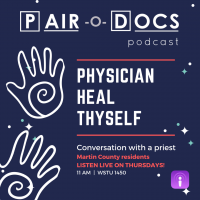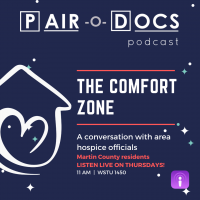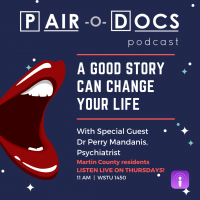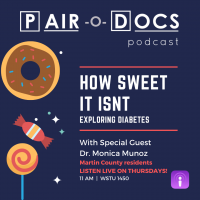Pair-O-Docs Podcast Episode 24: Physician Heal Thyself
The docs talk with Father Christian Anderson about spirituality and the power of prayer
The docs talk with Father Christian Anderson about spirituality and the power of prayer

The Docs talk with area hospice professionals about the wide array of services they offer dying patients and their families.

The Docs talk to renowned psychiatrist Dr. Perry Mandanis about the power of a good story and how it could make all the difference in your life. Dr Ira rants about the trend of Physician bashing and reviews the article Read More…

This week, Dr. Ira Pearlstine and Dr. Leighan Talton discuss diabetes.

Dr. Ira Pearlstine and Dr. Leighan Talton are joined in studio by Mindi Fetterman. Mindi is the founder of The Inner Truth Project, which offers therapeutic services to survivors of sexual trauma and provides education on prevention strategies and trauma to the Read More…

primary care, internal medicine, physician, patient, disease, primary care physician, vaccine, new york city, accessibility, health care, patient portal, family medicine, emergency medicine, cardiology, queens, ambulatory care, staten island, hypertension, long island, immunization, lower manhattan, upper east side, primary care physicians, primary, primary care providers, medical, primary care doctor, primary care services, concierge, concierge medicine, fee, physical examination, therapy, urgent care center, medical specialty, attention, exam, health insurance, comprehensive, medication, medical school, dietitian, weight loss, nutrition, weill cornell medicine, direct primary care, travel medicine, blood pressure, lifestyle, text messaging, medical history, mount sinai hospital, immunity, emergency, deductible, pain, stress, healthcare in the united states, residency, weight management, doctor of medicine, board certification, medical university of south carolina, allergy, south carolina, transient ischemic attack, arterial blood gas test, lake whitney, gastroesophageal reflux disease, hematuria, back pain, vitamin b12 deficiency, shortness of breath, fatigue, blood gas test, healthgrades, dysthymia, menopause, headache, blood test, conjunctivitis, palpitations, ovarian cancer, university of south carolina, dysuria, internship, american board of medical specialties, vitamin d deficiency, lipid, nursing, cough, constipation, allergic conjunctivitis, university of south florida, vitamin, diverticulosis, nausea, bronchiectasis, calcium metabolism, asthma, orthopedic surgery, hip, urine, rhinitis, bladder, pharyngitis
Are concierge doctors real?
Concierge doctors are indeed real and represent a legitimate model of healthcare. They provide personalized medical services, focusing on direct physician-patient relationships for enhanced accessibility and tailored care.
Are concierge doctor fees worth it?
Concierge doctor fees are worthwhile as they provide personalized care, increased accessibility, and longer appointments, allowing for a more thorough understanding of patient needs and better health outcomes.
Are concierge doctors covered by insurance?
Concierge doctors typically require a membership fee that is not covered by insurance. However, patients can still use their insurance for specific services and treatments provided outside the concierge model.
Are concierge doctors a good idea?
Concierge doctors can be a great idea for those seeking personalized and accessible healthcare, as they offer a tailored approach that prioritizes individual patient needs and enhances the overall healthcare experience.
Are concierge doctors worth it?
The worth of concierge doctors lies in their personalized approach to healthcare, offering enhanced accessibility, tailored treatment plans, and greater doctor-patient relationships, making them valuable for individuals seeking dedicated and immediate medical attention.
What services do concierge doctors offer?
Concierge doctors offer personalized healthcare services that include extended office visits, direct access to the physician, preventive care, and customized health plans, ensuring patients receive comprehensive and timely medical attention tailored to their individual needs.
How do concierge doctors improve patient care?
Concierge doctors improve patient care by offering personalized attention, extended consultation times, and direct access to healthcare professionals. This model fosters stronger doctor-patient relationships, leading to tailored health services and proactive management of patients' overall well-being.
Are concierge doctor appointments always in-person?
Concierge doctor appointments are not always in-person. Many practices offer virtual consultations to provide flexibility and convenience for patients who may prefer or require remote access to their healthcare services.
How much do concierge doctor fees vary?
Concierge doctor fees can vary significantly based on several factors, including location, the services offered, and the physician's experience. Typically, annual fees can range from $1,200 to over $10,000, depending on the level of personalized care provided.
What is the typical patient-to-doctor ratio?
The typical patient-to-doctor ratio in concierge medicine is significantly lower than in traditional practices, often ranging from 50 to 600 patients per physician. This model allows for more personalized attention and enhanced care for each patient.
Can concierge doctors handle urgent medical needs?
Concierge doctors can indeed handle urgent medical needs. They offer enhanced accessibility, allowing patients to receive prompt care and personalized attention for urgent situations, ensuring timely interventions when necessary.
How to choose the right concierge doctor?
Choosing the right concierge doctor involves assessing their qualifications, communication style, and compatibility with your health needs. Look for a practitioner who prioritizes personalized care and offers services that align with your expectations.
Do concierge doctors coordinate specialist referrals?
Concierge doctors do coordinate specialist referrals. They prioritize personalized care by closely managing referrals to ensure patients receive the appropriate and timely specialist attention needed for their healthcare needs.
What makes concierge medicine different from traditional?
Concierge medicine differs from traditional healthcare by offering personalized, accessible care through a direct relationship between patients and physicians, often involving lower patient volumes and enhanced services tailored to individual health needs.
How often do concierge doctors follow up?
Concierge doctors typically follow up more frequently than traditional doctors, often reaching out after appointments to discuss test results, ongoing care, or health concerns, ensuring patients receive personalized attention and prompt support tailored to their needs.
Can concierge doctors provide preventative care?
Concierge doctors can provide preventative care by offering personalized health assessments and tailored wellness plans that focus on disease prevention and health optimization, ensuring patients receive comprehensive and proactive healthcare services.
Are concierge doctor services customizable for patients?
Concierge doctor services are customizable for patients, allowing tailored healthcare solutions based on individual needs and preferences. This flexibility ensures that each patient receives personalized attention and a unique care experience that aligns with their health goals.
What types of patients benefit from concierge medicine?
The types of patients who benefit from concierge medicine include those seeking personalized healthcare, individuals with chronic conditions requiring continuous management, busy professionals needing flexible access to care, and anyone preferring a more direct relationship with their physician.
Do concierge doctors accept insurance for services?
Concierge doctors typically do not accept insurance for their services. Instead, they operate on a membership model, allowing for personalized care that may not be fully covered by traditional insurance plans.
What is the average wait time for appointments?
The average wait time for appointments at Preserve Health MD is typically minimal, often ranging from just a few days to a week, ensuring you receive timely access to personalized healthcare services.
How do concierge doctors manage chronic conditions?
Concierge doctors manage chronic conditions by providing personalized care plans, regular monitoring, and direct access to their patients. This approach fosters strong relationships, enabling timely adjustments to treatment and proactive management of health issues.
Are there membership fees for concierge practices?
Membership fees are typical in concierge practices. These fees provide patients with enhanced access to personalized healthcare services, ensuring a direct relationship with their healthcare provider and a broader range of tailored care options.
Do concierge doctors offer telehealth services?
Concierge doctors do offer telehealth services. This allows patients to conveniently access care and consultations from the comfort of their homes, ensuring personalized attention and flexibility in their healthcare experience.
What qualifications must concierge doctors have?
Concierge doctors must have a medical degree, completed residency training, and be board-certified in their specialty. Additionally, they should possess strong interpersonal skills to provide personalized care and build lasting relationships with patients.
Are concierge doctors available after hours?
Concierge doctors are available after hours to provide personalized care and support for their patients. This accessibility ensures that you can reach out for essential medical assistance whenever it’s needed, enhancing your healthcare experience.
How do concierge doctors ensure patient confidentiality?
Concierge doctors ensure patient confidentiality by implementing strict privacy policies, utilizing secure communication channels, and adhering to HIPAA regulations, thus safeguarding sensitive health information while fostering trusting relationships with their patients.
What are the most common misconceptions about concierge medicine?
Common misconceptions about concierge medicine include the belief that it is exclusively for the wealthy, that it replaces traditional healthcare, or that it lacks comprehensive services. In reality, it offers personalized, accessible care that can enhance overall patient experience for everyone.
How does concierge medicine affect healthcare costs?
Concierge medicine affects healthcare costs by often requiring a retainer fee, which can lead to higher upfront expenses. However, it typically reduces overall costs through improved preventive care and fewer emergency situations, ultimately promoting more efficient health management.
Do concierge doctors provide comprehensive care?
Concierge doctors provide comprehensive care by offering personalized and preventive services tailored to individual patient needs. This model emphasizes detailed health assessments, ongoing communication, and accessibility, ensuring patients receive thorough and proactive healthcare attention.
What are the benefits of concierge medicine for families?
The benefits of concierge medicine for families include personalized care, increased accessibility to healthcare providers, and tailored health services that cater to the unique needs of each family member, fostering better overall health and wellness.
ira perry md, tag concierge, dr ira perry, dr mindi perry, preserve health md
